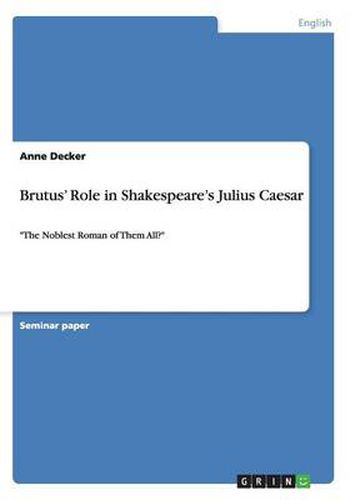Readings Newsletter
Become a Readings Member to make your shopping experience even easier.
Sign in or sign up for free!
You’re not far away from qualifying for FREE standard shipping within Australia
You’ve qualified for FREE standard shipping within Australia
The cart is loading…






Seminar paper from the year 2012 in the subject English Language and Literature Studies - Literature, grade: 1,7, University of Munster, course: Shakespeare - The Roman Plays, language: English, abstract: Upon reading Shakespeare’s The Tragedy of Julius Caesar one would agree that Marcus Brutus is the character which, at first glance, appears to be most likeable. Honour as value is something that turns up frequently throughout the play, especially with regard to Brutus. Being the one that murders a friend in order to free the people from tyranny, he acts according to his personal conception of honour. It is not without facing an inner conflict that he decides to put aside his personal feelings of friendship in order to serve the common good. This is what one could say about Brutus if matters were as clear as that. On closer inspection, however, one quickly takes notice of discrepancies as to Brutus’ character and actions. Carrie Pestritto states that Brutus’s honour […] gives him an almost Christ-like aura whereas others see him as ambiguous and his character as not to be defined unequivocally. The idea of honour can be interpreted in many different ways and the characters’ understanding of honour differ immensely. ‘Caesar was ambitious […] and Brutus is an honourable man’ (3.2.79-88). Are things really as simple as that? Kullmann, referring to Pestritto here, poses a question that will be discussed in this paper. The focus is to be on Brutus and his view of the events, evaluating his actions and the reasoning they are based on. It will be possible to see that his only way of coming to a decision and carrying out the assassination is by means of self-delusion. To open himself up to and reconcile with the idea of committing a murder, he has to construct his own fiction, ending up living in a fool’s paradise. For him the way things appear to be weighs down what they are in reality. Important in the above mentioned context is Brutus’ part in the conspiracy, w
$9.00 standard shipping within Australia
FREE standard shipping within Australia for orders over $100.00
Express & International shipping calculated at checkout
Seminar paper from the year 2012 in the subject English Language and Literature Studies - Literature, grade: 1,7, University of Munster, course: Shakespeare - The Roman Plays, language: English, abstract: Upon reading Shakespeare’s The Tragedy of Julius Caesar one would agree that Marcus Brutus is the character which, at first glance, appears to be most likeable. Honour as value is something that turns up frequently throughout the play, especially with regard to Brutus. Being the one that murders a friend in order to free the people from tyranny, he acts according to his personal conception of honour. It is not without facing an inner conflict that he decides to put aside his personal feelings of friendship in order to serve the common good. This is what one could say about Brutus if matters were as clear as that. On closer inspection, however, one quickly takes notice of discrepancies as to Brutus’ character and actions. Carrie Pestritto states that Brutus’s honour […] gives him an almost Christ-like aura whereas others see him as ambiguous and his character as not to be defined unequivocally. The idea of honour can be interpreted in many different ways and the characters’ understanding of honour differ immensely. ‘Caesar was ambitious […] and Brutus is an honourable man’ (3.2.79-88). Are things really as simple as that? Kullmann, referring to Pestritto here, poses a question that will be discussed in this paper. The focus is to be on Brutus and his view of the events, evaluating his actions and the reasoning they are based on. It will be possible to see that his only way of coming to a decision and carrying out the assassination is by means of self-delusion. To open himself up to and reconcile with the idea of committing a murder, he has to construct his own fiction, ending up living in a fool’s paradise. For him the way things appear to be weighs down what they are in reality. Important in the above mentioned context is Brutus’ part in the conspiracy, w